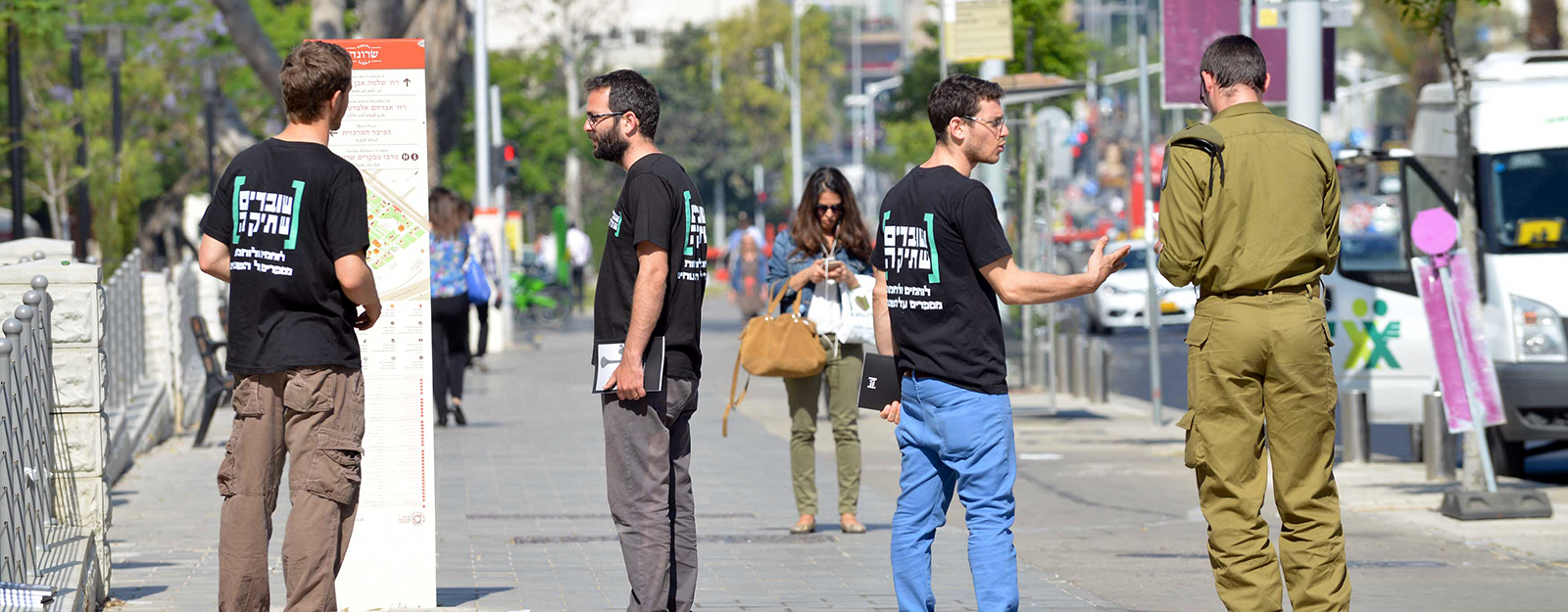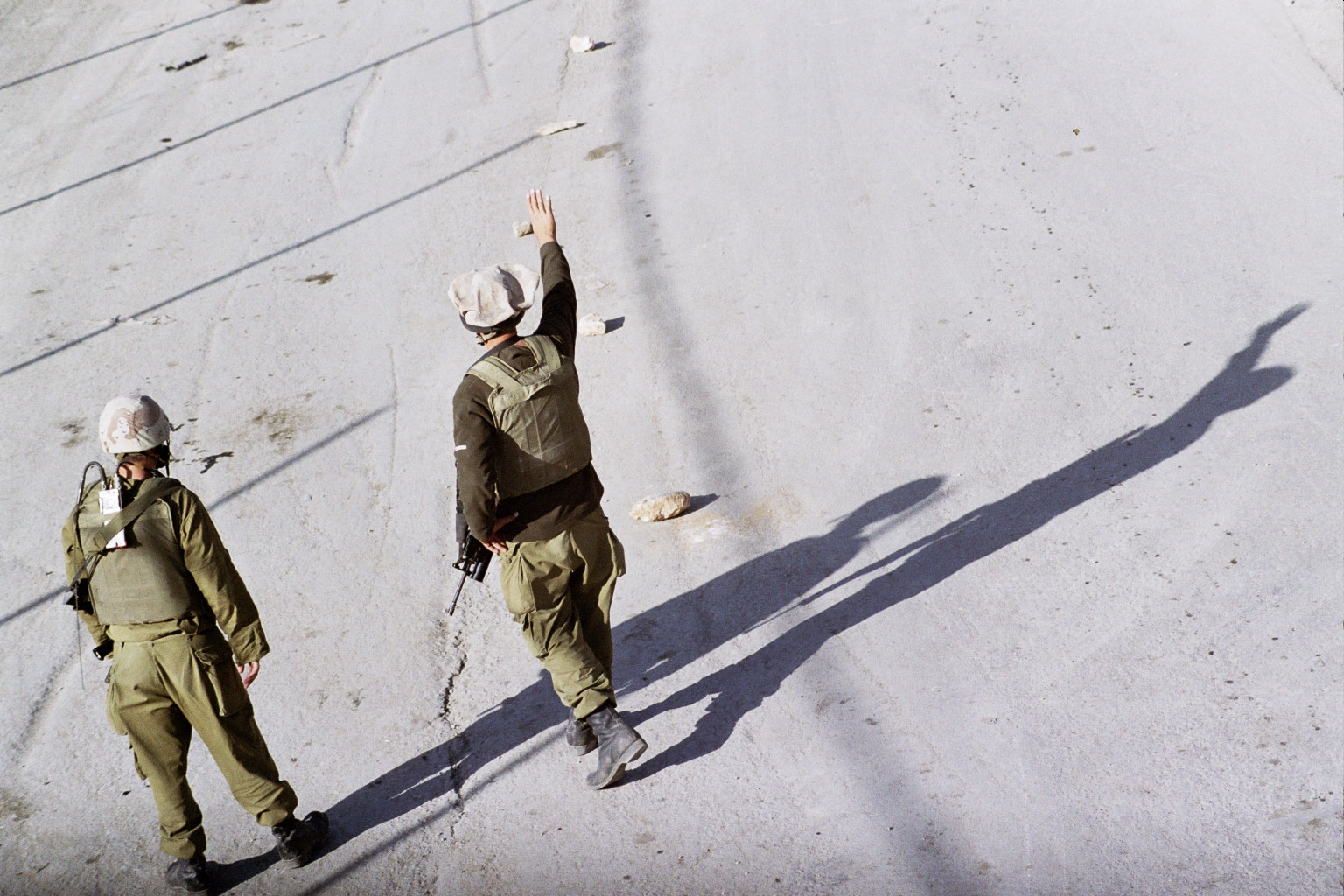What’s the checkpoint in Qalqilya called? There’s a lot: The Eyal crossing, the Eliyahu crossing, that’s the fruit checkpoint, the Zufim barrier—that’s a funny story. In principle, it’s an agricultural checkpoint for Palestinians only, but the residents of Zufim who live close by think they have privileges, so they complain to the officer in charge of residents in the area, it’s in the brigade’s jurisdiction. Because of the complaints, they decide that the Zufim residents can also cross there.
Did that affect the Palestinians’ ability to cross there or the way the checkpoint was run? I think that an agricultural gate is an agricultural gate—Bolem 7 is an agricultural gate, Jews don’t go through there, so why should the people from Zufim cross here? Though it wasn’t just Zufim residents, it was anyone who had a permit, I don’t remember exactly. Anyway, it’s a pretty funny checkpoint. On the one hand, in the beginning we didn’t check anyone coming from the Israeli side of the fence to the Palestinian side, but then there was the crossing administration, which was basically established to oversee the transfer of all kinds of goods. Customs, for example, deals with certain goods like textiles and furniture, and it’s the same for agricultural goods. The crossing administration dealt more with dangerous substances. The way it was done was that the military police had the authority at the checkpoint and helped them, because they didn’t have certification. The number of people working at the checkpoint always changed. In terms of the goods going into the Territories, there was concern that they’d start making Qassam rockets in Judea and Samaria. I remember standing at the checkpoint at the entrance to Tul Karem. An Israeli Arab came with two and a half iron pipes and received a summons, because theoretically, if you bring in dual-purpose goods—so, you used to be able to bring in iron, but you can use it to make . . .
There’s a prohibition on bringing things like that into the West Bank? If I’m not mistaken, it’s prohibited to do business in the Territories. When they buy vegetables or meat, for example, Israeli Arabs are limited to three kilograms of meat or three containers of olive oil, during the olive harvest it’s five, but it’s always limited. An Israeli Arab can’t go back in with twenty bottles of oil.
And what about bringing things into the West Bank? Things like secondhand stuff aren’t allowed into the West Bank unless it’s approved by the administration. From what I remember, they checked you only if you were going from the Palestinian side to the Israeli. Mostly, if you went from the Israeli side to the Palestinian, there wasn’t much of an inspection, but it also changed with the priorities.
You’re saying that if they caught someone bringing in iron it’s a summons and a fine, even if it’s from Israel to the West Bank? The way it works is that I’m the authority, and if the person doesn’t cooperate—let’s say that all I want to do is check his papers. If someone has certain goods and he doesn’t have papers, then I can’t know where the goods are going. I can’t say that he has a bill of lading for where he’s going. I get the bill of lading and see if it exactly matches what he has. You learn to identify whether the bill of lading is valid or forged. Mostly, if it’s from the Israeli side, it’s either goods you can transfer or not, or maybe that person was summoned for having an iron pipe or two, and he can’t cross. You don’t need a bill of lading or a receipt if the guy at the crossing administration defined the item as dual-purpose or dangerous—you just don’t let him through.
Is there a list of products forbidden to bring into the West Bank? Yes.
What are dual-purpose or dangerous items? Dual-purpose is something like iron—it’s brought in by weight and only with the platoon’s permission, all kinds of trucks, say from the Palestinian side to the Israeli side, that you let through. If, say, there’s a truck filled with iron, and it doesn’t have permission from the platoon—you turn it back . . . I once saw the list of substances, materials that you come across and you start to feel bad, because you just don’t know what to make of them. I can’t list them for you, but I trust the list because the people who put it together were in the military police and now work in the administration. They know which materials are allowed and which aren’t. If it’s dual-purpose, a piece of scrap iron or something, even just a small amount, it can’t cross, especially from the Israeli side.
Fertilizer and things like that? That, too. Probably if you have fertilizer, acetone—it’s for explosives.
And these are things you say you can’t bring in, not even in small amounts. There are certain cases where they make sure it’s enforced. The guy from the administration uses his discretion, and I back him up.
There’s room for discretion. Is there a situation where you can get permission to bring dual-purpose materials into the Territories? Say someone’s building a house and needs metal beams, what does he do? When it comes to construction, they manage just fine, and they don’t need to bring anything from Israel.
Where do they get them from? I don’t know, but they do construction there. I dealt a lot with trucks transferring earth, concrete, etcetera. As long as they have documentation that lists what they’ve got in the truck—mostly, it’s Arab Israeli construction companies.
Did every checkpoint have a list of what was and wasn’t allowed, or just at the terminals? It’s different at every checkpoint. If you’re near Bet Iba, and there’s an asbestos quarry close by, I imagine that a truck can cross there, but not from the Israeli side. If it came from the Israeli side, it would need to go through all the steps. There are also restrictions on Jews, not just on Israeli Arabs.
Do you distinguish between Israeli Arab and Jewish drivers and what they can transfer? Each checkpoint has its own procedures. At Eliyahu there’s a lane just for the Shomron residents and the red lane is just for Israeli Arabs and Israelis. The next lane is only for Palestinians. They can also transport goods, but we cooperate with the Border Police on inspections, and they can only bring goods in if they have a permit saying it’s for a business, then it’s okay. It’s all according to the permit.
Who produces the permit? The District Coordination and Liaison office.
What’s Operation Three Circles? The crossing administration normally does the inspection, but where we came in was when the military police would guard them, sometimes it would be a combat soldier and you’d guard him. The focus is on entry from the Israeli side to the Palestinian. There are checkpoints with no one, so the guy from the administration does the inspection alone, but he has authority or someone with him has the authority. Let’s say the military police have more authority at the checkpoint than the civilian police. Apart from the ordinary duties of the police, there are all kinds of places where a military policeman’s there to inspect items entering Israel. Like I said, because of concern about transferring Qassam rockets.
Basically, Operation Three Circles meant that someone from the administration does the inspection on the Israeli side. Some checkpoints there’s only one person from the administration there, and it’s a problem because the checkpoint has two directions. Some places there are more. But even then, he needs someone with him at the checkpoint who has authority. That’s why they’d normally be on the side where goods go into the Palestinian side. Again, when we’re talking about goods it’s usually things coming over in Israeli vehicles. If it comes from the Palestinian side in an Israeli vehicle, then there’s normally an inspection and the guy from the administration is on the side of the checkpoint where the Palestinian vehicles come . . . for Palestinians you check the whole crate, but in general you inspect 20 percent of a large truck, like those Volkswagens.









 testimonies
testimonies  media & content
media & content 










 Some products it’s forbidden to bring into the West Bank
Some products it’s forbidden to bring into the West Bank 

 terms of use & privacy policy
terms of use & privacy policy